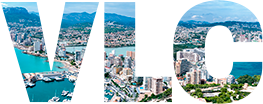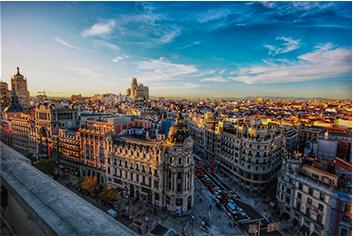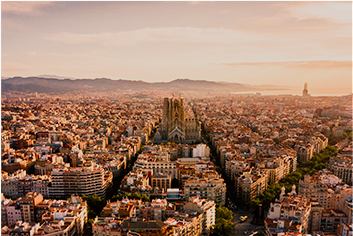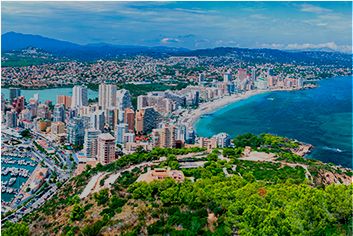WHAT IS BETTER THAN STUDYING AT ONE OF EUROPE'S TOP UNIVERSITIES?
BEING ABLE TO DO SO IN SPAIN
Perfect communications
They have international airports and are perfectly connected to the rest of Spain and Europe.
Cultural Activities
The range of cultural activities in both cities is ongoing and covers all tastes: shows, music, theater, dance, cinema, painting, sculpture, etc.
Exquisite cuisine
You can enjoy the typical Spanish tapas or top-class Spanish cuisine restaurants, markets and gastronomic fairs.
- 4 million inhabitants (7million in the metropolitan area).
- Cold winters (Min 4-5ºC and Max 12ºC) and mild / warm summers (20-32ºC)
- Sun (2,691 sun hours / year)
- Pozuelo Campus 20 minutes from Madrid
- Spanish is the official language and classes are taught in Spanish and / or English.
- 1.6 million inhabitants (3.2 throughout the metropolitan area).
- Cold / mild winters (Min. 4-5ºC and Max. 16-17º C) and hot summers (19-28ºC).
- Sun (2,513 sun hours / year)
- Barcelona campus in the center of the city, Spanish and Catalan are the official languages and classes are taught in Spanish and / or English.
- 800.000 inhabitants 2 million for the entire metropolitan area). It is the third most populated city in Spain.
- Cold / mild winters (Min. 4-5ºC and Max. 16-17ºC) and hot summers (19-33ºC).
- Sun (2.886 hours sun/year). More than 300 days of sunshine per year.
- Valencia Campus in the city centre
- Spanish and Valencian are the official languages and classes are taught in Spanish and/or English.
Services
International
Office

Professional careers
Company Internships
ESIC Entrepreneurs and
ESIC Alumni.

Accommodation areas and options

Madrid
Areas
- If you want to live near the School: the areas closest to the Campus are Pozuelo de Alarcón, Aravaca, Majadahonda, Las Rozas and Boadilla.
- If you want to live in the city center: Moncloa, Ciudad Universitaria, Barrio de Salamanca ... are some of the options you have.
Accommodation options
- Student residences:
- Nodis Madrid Pozuelo
- Student Experience Madrid Pozuelo
- Nido Aravaca Madrid
- Livensa Living Madrid Aravaca
- Residencias Nebrija
- Residencia Collegiate
- Colegio Mayor Argentino
- Nexo Residencias
- Websites and agencies
- Mi casa Inn
- P y R Soluciones
- Aluni
- Accomadrid
- Be roomers
- DFlat
- Spot a Home
- Housing Anywhere
- Alojamientos Pablo Gallego
- Room matte list
- Once the registration is formalized, from the Virtual Campus, you can look for flatmates through a "notice board"

Barcelona
Areas
- If you want to live near the School: the District of Sarrià-Sant Gervasi, is where both the University campus and the Postgraduate campus are located.
- If you want to live in the center of Barcelona: Eixample, Gràcia or Les Corts.
Accommodation options
- Student residences:
- Nexo Residencias
- Residencia Universitaria Sarrià
- Residencia Emilie de Villenueve
- Residencia de estudiantes Tres Torres
- Residencia de estudiantes Roca
- Residencia Universitaria Barcelona Diagonal
- Websites and agencies
- Be roomers
- Spot a Home
- Vive Barcelona
- Barcelona Home
- Resa Housing
- Altiro Barcelona
- Housing Anywhere
- Room matte list
- Once the registration is formalized, from the Virtual Campus, you can look for flatmates through a "notice board"

Valencia
Areas
- If you want to live near the School: the university area of Blasco Ibáñez, Tarongers, Xuquer, Ramon Llull and Manuel Candela is where the campus is located.
- If you want to live in the centre of Valencia: El Pla del Remei, Pla del Real, El Carmen or Ruzafa.
Accommodation options
- Student residences:
- ESIC: San Francisco Javier // Av. de Blasco Ibáñez, 55, 46021 Valencia
- Collegiate Marina Real // Carrer de Francesc Cubells 7 46011 Valencia
- Damià Bonet Residence Hall
- Galileo Galilei University Residence
- Ausias March Hall of Residence
- Websites and agencies
- Idealista
- Badi
- Habitoom
- Fotocasa
- Spotahome
- Habitaclia
- Room matte list
- Once the registration is formalized, from the Virtual Campus, you can look for flatmates through a "notice board"
Transport
Madrid
Madrid-Barajas Adolfo Suárez Airport
Underground/Subway
Commuter train
Urban and intercity buses,
tram / light rail ...
AVE (high speed train)
Barcelona
Barcelona El Prat Airport - Josep Tarradellas
Underground/Subway, urban and intercity buses ...
Commuter train
Catalan Generalitat Railways (FGC)
AVE (high speed train)
Barcelona's port
Valencia
Valencia Manises Airtport:
Underground/Subway, urban and intercity buses...
Commuter train
AVE (high speed train)
Valencia´s port
HOW TO OBTAIN A STUDENT VISA
WHAT IS A STUDENT VISA?
This is an authorisation to stay in Spain for a period of more than ninety days to carry out or extend studies in an authorised educational centre in Spain, in a full-time programme, leading to the award of a degree or certificate of studies.
I NEED A STUDENT VISA?
I AM A EUROPEAN CITIZEN:
No EU citizen needs a student visa.
When they do the EU registration, once they enter Spain, they will be given the NIE: Número de Identidad de Extranjero (Foreigner's Identity Number).
I AM NOT AN EU CITIZEN:
In the case of non-EU citizens, it will be necessary to apply for a study visa. Once processed, they will be granted the NIE.
In addition, for visas longer than six months, you must apply for the TIE (Tarjeta de Identidad de Extranjero) once you arrive in Spain.
DOCUMENTATION REQUIRED FOR STUDENT VISAS
If the procedure is initiated from outside Spain:
National visa application form, in official format, two copies, fully completed and signed by the foreign national or his/her representative. This form can be obtained on the website of the corresponding consulate at www.exteriores.gob.es.
Valid passport or travel document, recognised as valid in Spain, valid for at least the period for which the stay is requested.
If the procedure is initiated in Spain:
Application form on the official model (EX00, fully completed and signed by the applicant. This form can be obtained at the following link), and proof that you are regularly present in Spanish territory and that the application is submitted at least one month before the expiry date of your status.
Documentation accrediting compliance with all of the above requirements:
- Documentation accrediting that you have the necessary financial means for the period you are applying for and for the return to the country of origin. Any means of proof may be used, such as your own means or those of family members, subsidies, grants and scholarships, among others.
- Documentation accrediting the availability of medical insurance. This requirement will also be considered fulfilled if the educational institution takes out insurance for the student that covers all the risks normally covered for Spaniards.
- Documentation accrediting that the student has been admitted to an educational institution, including a letter of admission or a certificate of enrolment, among other options.
- In the case of underage students, authorisation from parents or guardians stating the centre, organisation, entity, and body responsible for the activity and the planned period of stay.
- Medical certificate stating that the student does not suffer from any of the diseases with repercussions on public health.
- If you are of criminal age, a clean criminal record certificate issued by the authorities of your country of origin or the country where you have resided for the last five years
IMPORTANT:
When documents from other countries are provided, they must be translated into Spanish or the co-official language of the territory where the application is submitted.
All foreign public documents must first be legalised by the Spanish Consular Office with jurisdiction in the country where the document was issued or, where applicable, by the Ministry of Foreign Affairs and Cooperation, unless the document has been apostilled by the competent authority of the issuing country in accordance with the Hague Convention of 5 October 1961 and unless the document is exempt from legalisation by virtue of an International Convention.


